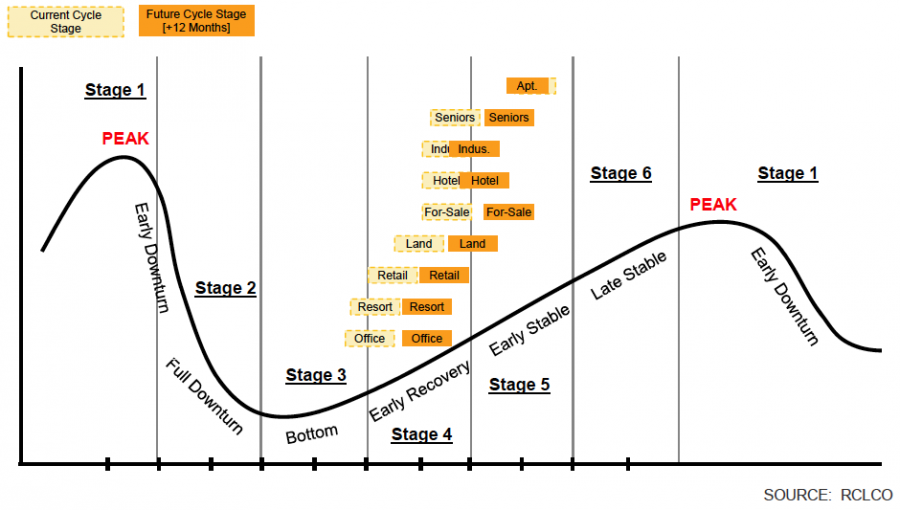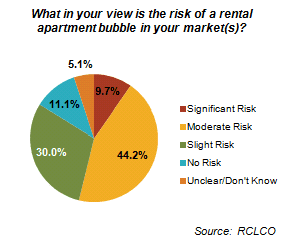Real Estate Turns the Corner
Multifamily rental apartments have been out of the woods since early 2011 in many parts of the country, but most other real estate sectors are now moving from bumping along the bottom to recovery and growth mode. According to RCLCO’s 1Q 2013 National Real Estate Sentiment Survey, respondents report that most real estate sectors are now in, or rapidly approaching, Stage 4-Early Recovery. This is in sharp contrast to 3Q 2012, when most sectors were firmly stuck in Stage 3-Bottom.
The land uses that have made the most progress include industrial, land, and the for-sale housing sectors. Rapid sentiment improvements for land and for-sale housing are consistent with the recent NAHB report that there are more new homes under construction today than at any time over the last five years. Multifamily continues to lead the pack, with most survey respondents placing this land use in Stage 5-Early Stable. Interest- ingly, over one-third of respondents believe that multifamily has progressed into Stage 6-Late Stable. This is the stage in the cycle when market participants should begin to deploy proactive defensive strategies, such as pruning marginal deals, raising hurdle rates for new investments, and lining up capital for opportunistic deals that will present themselves in the next downturn.

There has also been a significant improvement in the cycle position for office and retail over the past two quar- ters, although the majority of survey respondents believe that these sectors are still barely out of the basement and have yet to enter significant growth mode. The second home/resort sector moved up the farthest along the cycle graph over the past two quarters, but is still considered to be bumping along the bottom by the majority of respondents.
The good news is that every real estate sector is forecasted to continue to improve and to be in growth mode over the next six to 12 months. This sentiment is consistent with our view that all real estate sectors are in an expansionary phase of the cycle. If history is any guide, it is likely that it will take time for the level of new development to fully respond to increasing demand, which should result in a good environment for development and investment.
Apartment Bubble?
 An increasing percentage of real estate industry professionals—54% of survey respondents—believe there is a moderate or significant risk of an apartment bubble in their markets. This percentage is up from 43% in 3Q 2012.
An increasing percentage of real estate industry professionals—54% of survey respondents—believe there is a moderate or significant risk of an apartment bubble in their markets. This percentage is up from 43% in 3Q 2012.
While it is true that there are selected submarkets and micro markets that could well experience periods of softness while new supply is digested by the market, we believe the risk of a widespread apartment bubble in the near term is fairly low. New construction is up significantly compared with historically low production levels during the Great Recession, but is still only 60% of long-term averages. Furthermore, the number of 20-34 year olds is continuing to increase, and improving job markets will induce more Gen Ys to decouple and form households, many of whom will rent for at least five years. Having said this, it is more important than ever to choose apartment locations wisely and assess the likelihood that pipeline projects will materialize and the implications that potential additional supply will have on investments at the submarket level.
Disclaimer: Reasonable efforts have been made to ensure that the data contained in this Advisory reflect accurate and timely information, and the data is believed to be reliable and comprehensive. The Advisory is based on estimates, assumptions, and other information developed by RCLCO from its independent research effort and general knowledge of the industry. This Advisory contains opinions that represent our view of reasonable expectations at this particular time, but our opinions are not offered as predictions or assurances that particular events will occur.
Related Articles
Speak to One of Our Real Estate Advisors Today
We take a strategic, data-driven approach to solving your real estate problems.
Contact Us









